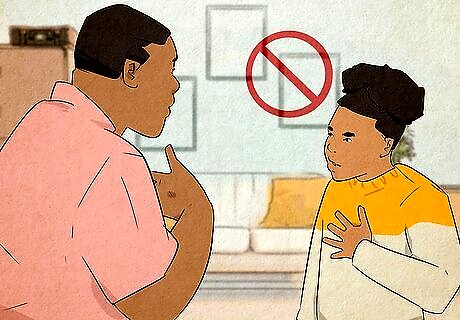
views
Emotional Assessment

Calm down. When you feel that your parent has wronged you in some way, you might be tempted to lash out in anger. For instance, if your parent has recently taken away your car or phone, you might feel anger towards them. However, you might find that you tend to say things that you don’t mean when frustrated or mad. Step away from the situation or conversation that is affecting you and take a few moments to breathe and calm down. Breathe in deeply through your nose and exhale through your mouth. Say to your parent “Do you mind if I take a 5 minute break from this conversation to clear my head?” Quiet moments alone tend to provide greater clarity.

Journal your thoughts. Your feelings for your parents may feel chaotic in your head. Writing them down is a great way to process your thoughts, remain calm, and begin developing what you will say to them. Get out a notepad and write down exactly what you are thinking and feeling. It might be helpful to write a poem or a song if you are feeling creative.

Consider the source of your feelings. Sometimes, you might find that you lash out in anger at the wrong person due to stressful circumstances that are outside of their control. For instance, maybe you were bullied at school all day and then you came home to your mom asking you to clean your room. Though your anger has been building all day, you should not take it out on an innocent party. Consider also any behaviors or comments your parents have made that have built towards this moment, as hate does not typically come about all of a sudden, but usually builds over time.

Determine if ‘hate’ is an appropriate descriptor. After some reflection on the circumstances, you may feel that hate is not appropriate and that what you want to say is “I am angry with you” instead. Other times, you may feel that your hate is justified. Perhaps your parent has been abusing you or neglecting you for years. In these instances, hate is understandable. However, if your parent has grounded you for a few weeks because you got in trouble in school, this action probably does not justify you hating them. Keep in mind that you cannot take back what you say. Consider if telling your parent that you hate them will make you feel better or truly depict how you feel.

Consider their perspective. Think about the circumstances that have led you to hate your parent and consider why they have acted as they have. Perhaps your parent has a mental health disorder or has been a victim of abuse. Though this is no excuse for mistreating you, it can help you to at least make sense of the situation. Begin breaking negative family patterns through open and honest communication. Oftentimes, developing sympathy will dissipate some of the hate you might feel.

Talk to friends or siblings. Before you tell a parent that you hate them, you should discuss your feelings with family or friends who you trust. Perhaps a friend of yours has gone through a similar period; vent to them. Your siblings can be particularly helpful through this as they may feel the same or have some advice on how to move forward. Say something like “Do you remember when you and your dad were fighting a lot? Whatever happened to end that?”
Healthy Discussion

Talk to them privately. When you do decide to speak to your parent, you will want to ensure that you do so discreetly. Don’t talk to them in a crowd or in front of people who are not aware of the situation. Instead, set aside some time to speak to them away from noise and people. You might say “Hey mom, can we talk some time tonight about something? Maybe we could go for a walk in the park?” Either have this conversation on the phone or invite an adult you trust if you feel that you will be in physical danger.

Don’t speak in anger. Hate typically comes from a place of deep anger or hurt, but you must control these feelings during your conversation. Before you begin the talk, meditate, pray or take some deep breaths until you feel as calm as possible. Speak to them honestly and not with wrath or bitterness.

Tell them how you feel. Once the time comes, begin the conversation in as nonthreatening a way as possible. Do not yell, scream or curse at them. Be very honest and open and get out all of your true feelings about them. Say “I have been thinking about this for a while. As parent and child, our relationship should not be this way. But because of things that have happened, and things that you have done specifically, I hate you.”

Don’t be defensive. Resist the urge to try to defend yourself once your parent begins speaking from their perspective; remember that this is a conversation, not a trial. Do not repeat yourself over and over, either. This discredits and cheapens your words. For instance, if your parent says “Well, you are an ungrateful child”, don’t try to reason them out of this. Say instead “I hear you and will think more about that but it doesn’t change my feelings.”

Listen. Though you should not be defensive, you should listen to your parent. This is both a time for you to get out your feelings and for them to do so, too. Situations or circumstances may exist in their life that you did not know about which may diminish the hate you feel. Allow them to speak without interruption. Avoid preparing a response in your head while they are speaking. Remember that what they say might provide you with the clarity that you need to move forward.

Enlist the help of others. If you feel threatened by your parent or would simply like some support during this talk, invite a trusted adult relative to be present. Make sure this is a person who is not completely against your parent because your parent may feel ganged up on. Tell this person to either remain silent or to mediate when necessary. The presence of an adult can prevent violence from escalating. They can also help provide mutual advice that will end the conversation in a positive way. Ask your other parent, grandparent, aunt or uncle.

Write a letter. Perhaps you feel that you express yourself best on paper or that your parent won’t listen to you in person. Write a letter to your parent expressing how you feel and leave it for them in a place that they will find but others will not. You might begin by saying “I have been wanting to discuss this with you for a while and I’m finding it difficult to do in person, which is why I’m writing this letter to you now.” Consider typing the letter so that you can make edits easily.
Future Steps

Get some space. After you have told a parent that you hate them, the both of you will likely need some space to process. After the conversation is over, suggest that the two of you not interact beyond what is necessary for a few days or at least a few hours. Go for a walk, watch a TV show, or read to distract yourself and give yourself a mental break. Say something like “We have both stated our feelings. This was a very heavy conversation and I think we could benefit from some space from one another for a little while.”

Avoid fighting. During this period of space and even after it, avoid fights with your parent. Don’t nag or badger them. Don’t criticize or insult them. Remember that you establish peace in your home and in your relationships. Though people can disrupt that peace, you can restore it by controlling and moderating your responses. Do all within your power to avoid fights and arguments.

Fulfill your responsibilities. One way to avoid future arguments is to maintain your responsibilities and keep your promises. If you are supposed to do your homework everyday before dinner, then do so. If you are scheduled to babysit a sibling or mop the kitchen floor, do so without having to be reminded. This will help to ensure that you are doing all that is possible on your end to keep the peace. Remember that you cannot control others; you can only control yourself. Don’t try to get back at your parent by not doing your chores.

Seek therapy. If your relationship is salvageable, which most are, consider going to family therapy to work through your issues with your parent. Many therapists are trained to help restore families and give them better communication techniques. If you want to go to therapy alone, that is a great option, as well. Your therapist can help talk you through the problems that exist and help you improve your situation. Say to your parent “Hey Dad, I would really like for us to go to therapy together to work out our issues. I don’t want to hate you anymore.” If you are in school, you can also talk to your school social worker or counselor.

Forgive your parent. Your parent may have done something awful to you, something that you cannot move past. Remember that forgiveness does not mean that you have to have a relationship with them, forgiveness is for you and forgiveness is a choice. Holding onto hate for them will only detract from your happiness. You don’t have to forget what they did but you should try to let go of the hurt. Pray and meditate about forgiving your parent. Talk to a friend to get your emotions out. Consider also writing down what they did to you and then burning it or throwing it away to signify that you are letting go of the hurt.




















Comments
0 comment